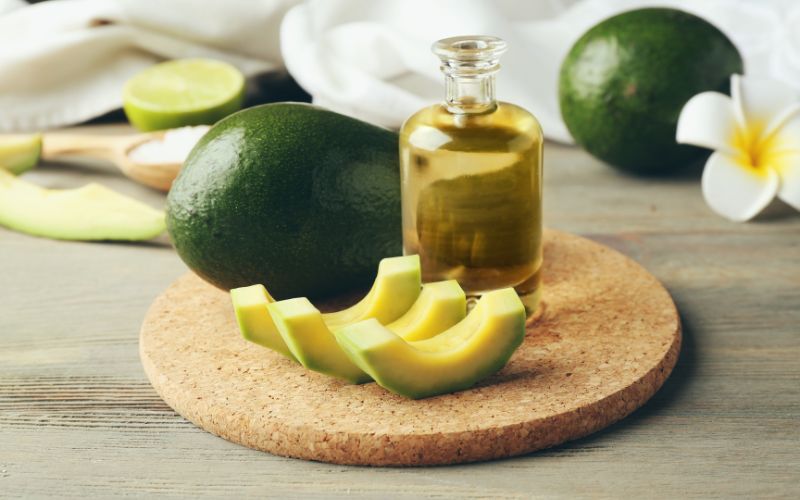Olive Oil vs Avocado Oil – When it comes to cooking, the type of oil you use can have a significant impact on both the taste and nutrition of your meals. Two popular choices in the realm of healthy cooking oils are avocado oil and olive oil. While both oils share similarities in terms of their nutritional profiles, they also have distinct differences that set them apart.
In this comprehensive comparison, we will delve into the details of avocado oil and olive oil, exploring their composition, health benefits, and cooking applications. By the end, you will have a clear understanding of which oil is better suited for your culinary needs.

Nutritional Comparison: Avocado Oil vs Olive Oil
Both avocado oil and olive oil offer a range of nutritional benefits due to their high content of MUFAs and antioxidants. However, olive oil tends to have a slightly higher nutritional profile, including potassium, calcium, iron, and vitamins. Here’s a comparison of the nutritional content per tablespoon of avocado oil and olive oil:
| Nutrient (1 Tablespoon) | Avocado Oil | Olive Oil |
| Calories | 124 | 119 |
| Total Fat | 14g | 13.4g |
| Saturated Fat | 1.6g | 1.86g |
| Monounsaturated Fat | 9.9g | 9.85g |
| Polyunsaturated Fat | 1.9g | 1.42g |
| Vitamin E | 0mg | 1.94mg |
| Vitamin K | 0µg | 8.13µg |
| Potassium | 0mg | 0.135mg |
| Calcium | 0mg | 0.135mg |
| Iron | 0mg | 0.076mg |
Avocado Oil: Nature’s Liquid Gold
Avocado oil is derived from the fruit of the avocado tree. The oil is obtained by pressing the flesh of the avocado after it has been peeled and de-pitted. This process extracts the natural oils, which are then filtered and sometimes cold-pressed to preserve the Avocado oil’s nutrient content.
The cold-pressed variety of avocado oil is especially prized for its richness in nutrients, as heat processing during extraction can diminish some of its health benefits.
Avocado oil is renowned for its high concentration of monounsaturated fats and antioxidants, making it an excellent choice for promoting heart health and protecting against oxidative damage.

The Nutritional Profile of Avocado Oil
Avocado oil is not only delicious but also highly nutritious. It is rich in monounsaturated fats, which have been linked to improved cholesterol levels and a reduced risk of heart disease. A single tablespoon of avocado oil contains approximately 124 calories and 14 grams of total fat, with 1.6 grams of saturated fat.
It is worth noting that avocado oil does not contain any protein, fiber, or sodium. While avocado oil is not a significant source of vitamins and minerals, it does contain small amounts of vitamin E, potassium, Avocado contains calcium and iron.
Olive Oil: A Mediterranean Treasure
Olive oil has long been a staple in Mediterranean cuisine and is renowned for its numerous health benefits. Like avocado oil, olive oil is obtained by pressing the fruit it is derived from – in this case, the olive. The olives are pressed to extract their natural oils, which are then filtered and sometimes subjected to additional processing for refinement.
Olive oil is available in various types, including extra-virgin, virgin, and refined olive oil. Extra-virgin olive oil is considered the highest quality and is produced from the first pressing of the olives, without the use of heat or chemicals.

The Nutritional Profile of Olive Oil
Olive oil is celebrated for its abundance of monounsaturated fats, which contribute to its heart-healthy reputation. A tablespoon of olive oil contains approximately 120 calories and 14 grams of total fat, with 2.5 grams of saturated fat.
Unlike avocado oil, olive oil contains small amounts of vitamin E, vitamin K, potassium, calcium, and iron. These vitamins and minerals, along with their potent antioxidants, make olive oil a valuable addition to a balanced diet.
Olive Oil vs Avocado Oil
Similarities: Heart Health and Beyond
While avocado oil and olive oil have their unique characteristics, they share several similarities when it comes to promoting overall health and well-being. Let’s explore some of the common benefits of these two nutrient-rich oils.
1. Heart Health
Both avocado oil and olive oil are rich in monounsaturated fats, which have been shown to improve cholesterol levels and reduce the risk of heart disease. By substituting saturated fats with these healthier alternatives, you can positively impact your heart health and lower the risk of developing cardiovascular issues.
Incorporating avocado oil or olive oil into your diet can help raise levels of high-density lipoprotein (HDL) cholesterol, commonly known as “good” cholesterol while reducing levels of low-density lipoprotein (LDL) cholesterol, or “bad” cholesterol.
This cholesterol-balancing effect is crucial for maintaining optimal cardiovascular function.
2. Brain Health
In addition to benefiting heart health, both avocado oil and olive oil have been associated with improved cognitive function and brain health. The rich concentration of monounsaturated fats in these oils helps support healthy brain cells and facilitates proper neurotransmitter function.
Scientific reviews have indicated that regularly consuming olive oil, especially extra-virgin olive oil, may help prevent and slow the progression of neurodegenerative diseases like Alzheimer’s.
While more research is needed, the similar composition of avocado oil suggests that it may also provide similar brain-boosting benefits.

3. Gut Health
The health of your gut microbiome plays a crucial role in your overall well-being, impacting digestion, immune function, and even mental health. Both avocado oil and olive oil have been shown to support a healthy gut by increasing the abundance of beneficial gut bacteria.
These oils act as prebiotics, providing nourishment for the good bacteria in your digestive system. By promoting a balanced gut microbiome, avocado oil, and olive oil contribute to better digestion, enhanced nutrient absorption, and a stronger immune system.
4. Eye Health
Protecting your vision is essential, and both avocado oil and olive oil can contribute to maintaining healthy eyes. These oils are rich in antioxidants, including lutein, which has been linked to a reduced risk of age-related macular degeneration, a leading cause of vision loss in older adults.
Regular consumption of avocado oil or olive oil can provide your eyes with the necessary nutrients to protect against oxidative stress and maintain optimal eye health.
5. Anti-Inflammatory Properties
Chronic inflammation is a key factor in the development of various diseases, including cancer, diabetes, and heart disease. Both avocado oil and olive oil possess anti-inflammatory properties due to their high concentration of antioxidants.
These antioxidants help neutralize harmful free radicals and reduce inflammation in the body, thereby mitigating the risk of chronic disease. By incorporating these oils into your diet, you can support your body’s natural defense mechanisms and promote overall well-being.
Differences: Nutritional Variations and Culinary Applications
While avocado oil and olive oil share numerous health benefits, there are some notable differences between the two. These variations include nutritional content, smoke point, flavor profiles, and suitability for different cooking techniques. Understanding these distinctions can help you make an informed decision when choosing which oil to use in your culinary endeavors.
1. Nutritional Variations
In terms of overall nutritional content, olive oil edges out avocado oil. Olive oil contains higher levels of potassium, calcium, iron, and vitamins compared to avocado oil. These additional nutrients contribute to the overall nutritional value of olive oil, making it a slightly more nutritious option.
However, it is worth noting that avocado oil contains more monounsaturated fats than olive oil, which is beneficial for heart health.
2. Smoke Point
The smoke point of an oil is the temperature at which it begins to break down and emit smoke. Avocado oil has a higher smoke point than olive oil, making it more suitable for high-heat cooking methods such as sautéing, frying, and roasting.
The high smoke point of avocado oil, which can reach up to 482°F (250°C), allows it to withstand higher temperatures without undergoing chemical changes that can affect its flavor and nutritional composition. On the other hand, extra-virgin olive oil has a smoke point of around 376°F (191°C), making it better suited for low to medium-heat cooking and salad dressings.
3. Flavor Profiles
When it comes to flavor, avocado oil, and olive oil exhibit distinct characteristics. Avocado oil has a mild, neutral taste with a slightly nutty undertone, making it an excellent choice for those who prefer a less pronounced oil flavor. Olive oil, especially extra-virgin olive oil, has a robust and distinctive flavor profile. The taste of olive oil can range from fruity and grassy to peppery and bold, depending on the variety and origin.
While the flavor of olive oil can enhance the overall taste of dishes, it may overpower more delicate flavors in certain recipes. Consider your personal preference and the desired taste profile of your dish when choosing between avocado oil and olive oil.
4. Culinary Applications
Avocado oil and olive oil can be used interchangeably in many recipes, but their distinct characteristics make them better suited for certain culinary applications. Avocado oil’s high smoke point and mild flavor make it ideal for high-heat cooking methods such as stir-frying, searing, and grilling. Its neutral taste allows the flavors of other ingredients to shine.
Olive oil, with its lower smoke point and bold flavor, is better suited for low to medium-heat cooking techniques, such as sautéing vegetables, drizzling over roasted meats, and creating flavorful dressings. Extra-virgin olive oil, in particular, is highly valued for its rich taste and is best used in dishes where its distinct flavor can be appreciated.
Extra Virgin Olive Oil vs. Avocado Oil
Extra virgin olive oil (EVOO) and avocado oil are both healthy oils that are high in monounsaturated fats. They have similar nutritional profiles, but there are some key differences between the two.
- Smoke point: EVOO has a smoke point of 376°F, while avocado oil has a smoke point of 482°F. This means that avocado oil is better suited for high-heat cooking, such as stir-frying or roasting.
- Flavor: EVOO has a more pronounced flavor than avocado oil. Some people find the flavor of EVOO to be too strong, while others enjoy it. Avocado oil has a more neutral flavor, making it a good choice for cooking when you don’t want the oil to overpower the other flavors in the dish.
- Price: EVOO is typically more expensive than avocado oil.
Ultimately, the best oil for you depends on your individual preferences and cooking needs. If you are looking for an oil that is high in monounsaturated fats and has a neutral flavor, avocado oil is a good choice. If you are looking for an oil with a more pronounced flavor that is suitable for high-heat cooking, EVOO is a better option.

Cons of Avocado Oil: Considerations to Keep in Mind
While avocado oil offers numerous health benefits, it’s important to be aware of potential drawbacks or considerations when using this oil.
1. Price
Compared to other cooking oils, avocado oil can be relatively expensive. The cost of avocado oil is influenced by various factors, including the quality of the avocados used, the extraction methods employed, and the brand. If you are on a tight budget, the higher price point of avocado oil may be a factor to consider when deciding which oil to purchase.
2. Environmental Impact
Avocado production can have significant environmental consequences, particularly when it comes to water usage and deforestation. Avocado trees require substantial amounts of water to thrive, and the increasing demand for avocados has led to the cultivation of avocado orchards in regions where water scarcity is an issue.
Additionally, the expansion of avocado plantations has resulted in the clearing of land, contributing to deforestation in some areas. Considering the environmental impact of avocado oil production is crucial for environmentally conscious consumers.
3. Allergies
While rare, some individuals may be allergic to avocados or experience cross-reactivity with other fruits, such as bananas or kiwis. If you have a known avocado allergy or are prone to allergies, it is essential to exercise caution when using avocado oil and consult with a healthcare professional if necessary.
Avocado Oil and Olive Oil for Skin and Hair Health
In addition to its culinary uses, avocado oil offers benefits for the skin, and avocado oil is also good for hair health. Actually, also Olive oil. These oils are rich in antioxidants and healthy fats that can nourish and moisturize the skin and hair.
Avocado oil is easily absorbed by the skin and contains vitamins A, D, and E, which promote skin cell regeneration and protect against oxidative damage. It can help soothe dry, irritated skin, reduce inflammation, and improve overall skin texture.
Olive oil has been used for centuries as a natural moisturizer and skin protectant. Its high content of vitamin E and antioxidants helps combat free radicals, hydrate the skin, and promote a youthful appearance. Olive oil can also be used as a conditioning treatment for hair, helping to nourish and strengthen it.
Conclusion: The Choice is Yours
Both avocado oil and olive oil offer a plethora of health benefits and can be valuable additions to a well-balanced diet. While olive oil is slightly more nutritious and boasts a more pronounced flavor profile, avocado oil’s higher smoke point, and mild taste make it an excellent option for high-heat cooking methods.
Ultimately, the choice between avocado oil and olive oil comes down to personal preference, culinary needs, and the specific dish you are preparing. Consider the flavor, smoke point, and nutritional content of each oil to determine which one best suits your cooking style and taste preferences. And remember, moderation is key when incorporating any oil into your diet for optimal health.




